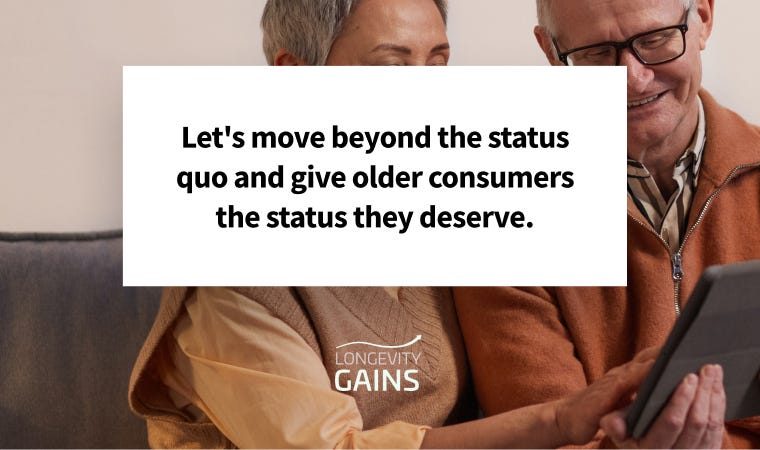Here’s What Older Consumers Deserve More Of
Respect your elders, for real. Plus longevity education, the stupidity of ageism, and unretirement on the rise.
Hello there!
I’m speaking at a conference this week for the first time on the topic of the longevity economy … in Florida.
(I suppose the stereotypical joke would write itself if we did that sort of thing around here.)
Speaking of ageism, there’s a fundamental element of marketing that our culture is getting backwards with older consumers – and this aspect of the status quo needs to change first.
When we talk about movements that change the status quo, we bring a powerful element of influence to bear – unity. But underlying that group identity is something more fundamental: status.
As soon as we belong, we begin jockeying for a position relative to others. This is the potent intersection of belonging and esteem in Maslow’s Hierarchy of Needs.
Status seeking is not inherently shameful; it’s inherently human. Even saying you don’t care about your social position is a form of status-seeking. It’s also a prime motivator for doing good things for others and society at large, and that’s in no way a bad thing. Just be careful with the virtue signaling and humble brags.
Marketing inherently caters to status. Inadequacy marketing plays on a lack of stature to prompt purchases, while empowerment marketing seeks to elevate social standing from a more positive frame. The type of status games people play go back to worldviews and values, so inappropriately playing the status card will alienate prospects instead of empowering them.
Older consumers are suffering from a crushing lack of status in the marketplace, which is even more puzzling when you account for the wealth and consumer spending power they wield. In this episode, Jerod and I discuss the first step to changing that with your marketing efforts.
Listen in:
The Initial Longevity Education
We already know that people in the U.S. with a college degree are the most likely to not only live longer, but to live healthier for longer. And we also know that as this trend continues, the market for “long life” training and retraining will explode.
In the meantime, you can’t miss the articles (and books, and podcasts) about the new longevity. Everywhere you turn, you’re getting tips on how to live to 100 years. And while we’ve distinguished between this “longevity industry” and the broader longevity economy, this mainstream awareness of how to extend healthspan (which is what it’s really all about) is important.
It’s also my hope that this awareness will move beyond the college-educated podcast crowd. If education is the key to healthspan, then there’s hope to expand the longevity and healthy life expectancy of more people with non-institutional information. This can only strengthen what our economy looks like as we continue the shift to a much older society.
Want to Live to a Healthy 100? Longevity Doctor Peter Attia Has Advice
The Stupidity of Ageism
When you’re a white, straight, male like me, it’s unlikely I’ll ever face racism, sexism, or discrimination based on sexual orientation. So as a 56-year-old, ageism is basically it for me, and it’s hard not to laugh at ageist young people, given that if they’re lucky, they’ll be up here in age eventually.
Like other forms of prejudice, ageism stems from fear. In this case, the fear is of knowing aging is happening to you too unless you’re unlucky enough to die young. How sad is that, given what we now know about our later years being the happiest of our lives?
Anyway, that’s the theme of this recent piece in Newsweek. Judging from the comment section, it’s going to take a lot more than this to change young minds. But the warning to younger people by the author about what could happen if they try to “go to war” with older people is chilling. Place your bets on who wins that one (they who have the gold make the rules).
Ageism Is the Stupidest Prejudice of All
Unretirement on the Rise
Over the last four years, I’ve watched “unretirement” go from an occasional novelty to an almost weekly topic. Baby Boomers are continuing to re-enter the workforce thanks to economic pressure combined with the hot job market.
With Further, our exploration of retirement centers around “Unretirement Planning” instead of just traditional retirement savings. I don’t see anything that indicates that Generation X will retire “on time” (whatever that means) in mass numbers. The challenge is to turn this development from a disappointment to the new normal, given that retirement isn’t all it’s cracked up to be, especially as a fixed-income citizen who spends their days doing very little.
Unretirement: the Lure to Return to Work
Keep going-





